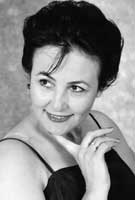Prof. Davidov Assia

VOICE (SOPRANO)
Assia Davidov grew up in Uzbekistan far away from the great center of musical metropole and opera. In early childhood she realized a great love for music, mainly singing, as her mother still used to sing folk and cradle songs for her. However nobody could guess that there was a talent growing up that would later be a wonderful combination of heart and artistic power, of feeling and intellectual pervasion.
In 1988 it was first confirmed that she was on the right way, a decision that she had made early in her life: she won the singing competition “Talents are welcome” in Tashkent, where she had started to study piano and then singing. She had never needed that confirmation for herself, for her the path was clear. For the world of music this 1st prize was however very important: it began to notice the young singer. Her debut was the Contessa in Mozart’s “Le nozze di Figaro”, a part with some difficulties and complexities. “Mozart is like a balm to the soul, but his seeming simplicity is often not possible to manage, neither technically nor stylistically. It requires a lot of discipline.”
Assia Davidov gratefully remembers her teachers, Friedl Teller-Blum, Bill Woodroff and the famous Raffaele Arié, who himself sang at the Scala in Milano for thirty years, but also Franco Iglesias, who also trained Placido Domingo. The final touch to her education was achieved in Israel at the Rubin-Academy and therefore it is not surprising, that only two years after her first win in the competition in 1990 she also won “The Voice of Israel”.
In the meantime a dream really had come true: the world famous Bolschoi Theatre in Moscow had contacted and engaged the young singer. Then in 1990 a scholarship of the American Cultural Trust launched the international career with an engagement in the USA as Antonia “Tales of Hoffmann”, Leticia “The old Maid and the Thief”, and Mimi “La Boheme”. Later on APA would report about her Mimi: “…. Assia Davidov let her wonderful soprano thrive.” Master classes with Martina Arroyo, Renata Scotto and Walter Berry also contributed further towards this.
The Vienna audience was lucky to experience her “wonderful soprano” when she also performed Mimi as a guest at the Wiener Kammeroper in 1992, however this had consequences: Austria did not let her go. She settled down and the next engagement followed right away: the following summer she sang Donna Elvira in Mozart’s “Don Giovanni” in the Schoenbrunn Castle. Then the Landestheater Innsbruck engaged this great singer and not only did her voice flourish further, but also her entire artistic personality developed in a large range of various roles: as Sandrina in “La finta giardiniera”, Donna Anna in “Don Giovanni”, again Contessa in “Le nozze di Figaro” in a matured performance, as Fiordiligi in “Cosi fan tutte” she first presented herself as stylistically confident Mozart performer and trained her voice for her next vocal fach that she intended to conquer: the Italian. As soon as she had acquired it she not only became the audiences’ favourite, but she also earned the critics’ praise and honour. She sang Alice in Verdi’s “Falstaff” and again Mimi as well as Adina in “L`Elisir d`Amore”, Amina in “La Sonnambula”, Leonora “Masquerade” and after a side step to Schoenberg’s “Moses and Aaron” she triumphed in the much dreaded part of Violetta in “La Traviata”. If she was already praised as for her “brilliant soprano” and “charismatic portrayal” in Donna Anna by the critics, the praise even increased after her Violetta, with the Vienna daily Kurier stating that the Vienna State Opera could only wish for such a Violetta. Others joined in this praise and applauded her portrayal of the role. Another great success was her performance in Offenbach’s “Tales of Hoffmann” about which the Kurier reported: “….. a great singer appeared in four female roles…. again her brilliant singing and artistic expression were superb.”
During this time there also were many guest performances: she performed Micaela in “Carmen” at the Frankfurt Opera, Amina in Regensburg, Antonia in Augsburg, Nedda in Swerdlowsk, Violetta in Budapest, Gilda, Pamina in“The Magic Flute” Nedda, Donna Elvira, “Abduction from the Serail” Konstanze, Norina with the Israeli Opera Theater, Contessa, Elena, Mimi, Antonia, Micaela at the New Israeli Opera and many more.
Operetta is sometime the neglected child, which may be unfair, at least as far as the requirements for the performers are concerned. The continuous change from singing to speaking requires a well-founded vocal technique. Assia Davidov has such a technique, problems of heights are unknown to her, she puts a lot of emphasis on nuances and so she delighted her audience as Rosalinde “Fledermaus”, Kurfürstin “Der Vogelhändler”(The Bird Seller) and as F. Lehar‘s Giuditta. “Hearts flew out to Assia Davidov”, the Vienna daily Kronen-Zeitung reported.
Even if she had chosen Austria as her home this did not mean that her international career with many more successful performances was neglected. Many guest performances led her across the world: again to the USA and to Israel, to Spain, South America, France, Germany, Russia and many more. She sang in Madrid, Granada, Barcelona, in Budapest and St. Petersburg (Philharmonic Hall) where “she overwhelmed the audience with her expressive soprano” (Dworzy), as well as in Hamburg, Hannover, Paris, London or Berlin and delighted her audience again with her Contessa and Violetta, but also with many new parts such as Saffi “Der Zigeunerbaron” (Gypsy Baron) “Il segreto di Susanna” as Susanna, “Vater Sergius”, in four female roles, “La Serva Padrona, Serpina, “Eugen Onegin” Tatiana, “Pique Dame” Lisa, and mainly the difficult parts “Nabucco” Abigail and Norma, that keeps being compared to Callas. An extract from the critic from the German daily “Sueddeutsche Zeitung” explains how Assia Davidov mastered this part: “As Norma she offers enough drama to fill the expressive passages with powerful timbre. Further she has the ability for the soft tones to present the fine nuances with a burning flame and a crystal clarity….” Other stages also wanted to listen to Norma: Freiburg, Ulm and even Tosca in Novosibirsk.
Thereby another change in her vocal fach was completed. Her voice had developed further, in the direction of Tosca, Manon Lescaut, and Butterfly but also to Turandot, to Wagner’s Senta in “The Flying Dutchman” and Strauss’ Salome.
A person who has such abilities is also open for the song and oratory; of course Assia Davidov did not avoid these challenges and her many evenings of songs and arias presented a wide and interesting repertoire, reaching from Mozart to Verdi, Rossini, Bellini and Tschaikowsky, Rachmaninoff Rimski-Korsakov, Glinka, Sviridov, Metner, Vlasov and Mussorgsky, but also include rarities like Henry Duparc, Rieger, Zeira and contemporary composers. She had guest performances in Germany, France and Great Britain with these programs, and also in the Wiener Konzerthaus, in the Wiener Musikverein and Wiener Staatsoper. In the meantime the Requiems by Mozart, Verdi and Brahms had become part of her repertoire. But the highlight should be Gustav Mahler’s 2nd Symphony, in which she sang under Georg Solti in Israel and Caspar De Roo in Innsbruck. But also other conductors called for her: Gary Bertini, Asher Fish, Dietfried Bernet, Ernst Maerzendorfer, Mark Daver, Alexander Steinitz, Georg Schmöhe, Wolfgang Göhnenwein, Artur Fagen, Walter Haupt, Arend Werkamp,Stanly Sperber, Aaron Charlap, Jevgenij Brazhnik, Andrej Tcistjakov, Marc Soustrot and many others.
In 2006 a new role presented a new challenge: Aida. Europe largest open air stage in St. Margarethen engaged the internationally renowned singer for a series of performances which was followed by a tour through half of Europe as far as Lemberg and South America – with a different cast and conductor. Almost 20 years of opera had not affected Assia Davidov’s voice, so that the Vienna daily Kronen Zeitung could assess: “Assia Davidov’s wonderful Aida shows a wonderful sound of her voice in all registers… her total presence and her artistic commitment present the singer as an interesting, artistic personality.” Of course these words of praise continued throughout the tour. Expressions like “great vocal abilities”, “high musicality” and “master piece” were heard, that she could “move and delight her audience” and that the difficult Nilarie was the “highlight of the entire evening” and that “nothing remained to be wished for”. “Standing ovations at the end”.
In the meantime her Repertoire includes more than 40 parts, among them Abigaille in “Nabuccco”, Elisabetta in “Don Carlos” and Elisabeth in Wagner’s “Tannhäuser”, Leonora in La Forza del destino, Tosca in “Tosca” with the number of performances and opera houses increasing continuously. Only a few examples shall be named here: Belgrade, Ljubljana, Prague, Strasbourg, Lyon, Paris, Marseille, Bordeaux, Nice, Geneva, Basel, Dusseldorf, Berlin, Nurnberg, Cologne, Lisbon, London, Cordoba, Malaga, Sao Paolo, Santiago de Chile, Montevideo, and Buenos Aires….
This also brought about interesting partners such as Bo Skovhus, Angelika Kirchschlager, and Michael Schade, Ildebrando d’Arcangelo, Janusz Monarcha, Soile Isokoske, Nancy Gustafson and others…
But the horizon has not been reached yet the path has not been completed. Still waiting are Amelia, Desdemona, and one or two others. And the audience is also waiting……
Stage directors that Assia Davidov has collaborated with:Jonathan Miller, David Alden, Dominique Mentha, Stephen Lawless, Markus Imhoof, Tilman Knabe, Wolfgang Kolneder, Claes Fellbom, Nicholas Muni, Joseph Rochlitz, Francesca Zambello, Robert Herzl and many others.



